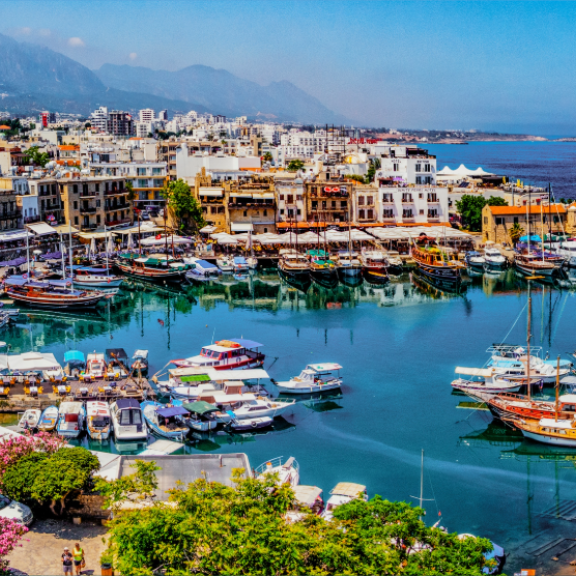
Emigrate to Cyprus
Emigrate to Cyprus: Find out the most important information here
Cyprus is a country on the island of the same name in the eastern Mediterranean and therefore borders the Mediterranean. For many who wish to emigrate to Cyprus, the combination of a mild climate, rich history and Mediterranean lifestyle is particularly appealing. The state came into being on August 16, 1960, when the former crown colony of Cyprus gained independence from the United Kingdom. Cyprus joined the Commonwealth of Nations in 1961. Emigrating to Cyprus therefore offers the opportunity to live in a country with a pleasant climate and an exciting cultural past.
Facts about Cyprus
Capital City
Nikosia
Population
1.24 million
Surface Area
5,748.3 mi² or 9,251 km²
Continent
Europe
Official Language
Greek, Turkish
Currency
Euro (EUR)
Emigrating to Cyprus: An overview of the political system
According to its constitution of 1960, the Republic of Cyprus is a presidential democracy in which executive power is exercised by the president as head of state and head of government. Since February 2023, this office has been held by the independent Nikos Christodoulides. The House of Representatives is elected every five years and currently consists of 56 Greek Cypriot MPs. The 24 Turkish Cypriot seats have been vacant since 1964. Since Turkey's military intervention and the subsequent occupation of a third of the island in 1974 following a coup against President Makarios, Cyprus has been divided into a Turkish Cypriot north and a Greek Cypriot south. The "Turkish Republic of Northern Cyprus", unilaterally proclaimed in 1983, is only recognized internationally by Turkey. The entire island has been a member of the European Union since 2004, although the application of EU law has been suspended in the occupied north of Cyprus. Efforts to resolve the Cyprus conflict have so far been unsuccessful. In January 2024, UN Secretary-General António Guterres appointed María Angela Holguín Cuéllar as his personal special envoy for Cyprus. She is currently exploring whether talks to resolve the Cyprus problem can be resumed under the auspices of the United Nations. Anyone wishing to emigrate to Cyprus should be aware of the political situation, but the country offers an attractive quality of life for expats. Emigrating to Cyprus is an interesting option for many due to the warm climate and cost of living.

Climate in Cyprus: Important information for emigrants
The climate in Cyprus is typically Mediterranean, which is a decisive advantage for many people who want to emigrate to Cyprus. The south coast is particularly sunny and dry, which is almost ideal for outdoor living. During the height of summer, temperatures there often reach 30°C to 35°C. It only gets noticeably cooler and rainier from late fall onwards. There are significant differences in temperature, especially between the coast and the interior. In the area around Nicosia, there is sweltering heat on many days in midsummer, with highs of up to 40°C. At the same time, it is much cooler in the center of the island in autumn and winter, and snow regularly falls in the Troodos Mountains. Anyone considering emigrating to Cyprus will appreciate the diverse climatic conditions, which offer both sunny coasts and cooler mountain regions.

Healthcare system in Cyprus: Important facts for emigrants
In Cyprus, the healthcare system is a high priority, which is an important factor for many people looking to emigrate to Cyprus. Preventative medicine is actively promoted and locals as well as foreign nationals emigrating to Cyprus for health reasons appreciate the quality of medical care in the country. There are a significant number of expats currently living in Cyprus who appreciate the high level of professionalism of the healthcare providers. Many of the medical professionals have received their training in the UK, which boosts confidence in medical expertise.
The healthcare system in Cyprus is of a high standard and is recognized by the World Health Organization as being comparable to developed countries. Foreign nationals are not required to be vaccinated when entering Cyprus as there are few cases of infectious diseases and epidemics throughout the country. Food and water safety is strictly monitored by the Medical and Public Health Services Department.
There are government hospitals in all major cities, while smaller government hospitals and clinics can be found in other parts of the country. There are also a number of private hospitals throughout the country. In general, healthcare is low-cost and is provided by three sectors: the government, the private sector and various other schemes that cover specific population groups. Government hospitals offer free services and private health insurance is also very popular, which makes emigrating to Cyprus particularly attractive.

Emigrating to Cyprus: An overview of the economic situation and quality of life
The gross domestic product per capita of Cyprus in 2024 amounted to 37,766.67 dollars. The Gini coefficient of wealth describes the distribution of wealth. The indicator is an established, internationally comparable measure of wealth inequality. It is measured on a scale from zero to one. The higher the value, the greater the inequality. The Gini coefficient in Cyprua is expected to be 0.31 in 2025 (source: Statista).
The crime rate in Cyprus is extremely low, which makes the country particularly attractive to many who wish to emigrate to Cyprus. Safety is one of the main reasons why emigrating to Cyprus is a popular choice. The standard of living is high and the population is open and tolerant towards newcomers. Thanks to the cultural and social diversity in Cyprus, daily life follows European standards.
For people emigrating to Cyprus, the country offers not only a safe environment, but also the opportunity to enjoy the benefits of the Mediterranean climate and a relaxed lifestyle. Emigrating to Cyprus makes it possible to branch out into a cosmopolitan community and benefit from the many positive aspects of this country.

National holiday
Independence Day
On October 1, 1960, the Greeks, Turks and British agreed that Cyprus should be an independent republic. Cypriots celebrate this independence every year on October 1st.
Quarantine regulations on entry
Cyprus has been divided since 1974, which is an interesting historical and political aspect for many who wish to emigrate to Cyprus. The north-eastern part of the island was proclaimed by the Turkish president as the Turkish Republic of Northern Cyprus. However, Northern Cyprus is only recognized by Turkey, while the UN continues to regard Northern Cyprus as part of the Republic of Cyprus.
The northern part is considered the Turkish part of Cyprus, while the southern part of the island is known as the Republic of Cyprus and is a member of the European Union. For people emigrating to Cyprus, the southern, Greek-dominated part in particular offers attractive living conditions due to its EU membership and stable conditions. The southern part is predominantly inhabited by people of Greek descent, which is why it is considered the Greek part of Cyprus.
The so-called Green Line, which also divides the capital Nicosia into two halves, separates the two parts of the island. This line is monitored by the United Nations Peacekeeping Force in Cyprus (UNFICYP) and is a fascinating feature of the divided island for many who emigrate to Cyprus.

Emigrate to Cyprus - Entry Requirements
Entry is possible for German nationals with the following documents:
a) for the Republic of Cyprus
- Passport: Yes
- Temporary passport: Yes
- Identity card: Yes
- Provisional identity card: Yes
- Children's passport: Yes
b) for the northern part of the island of Cyprus (so-called "Turkish Republic of Northern Cyprus")
- Passport: Yes
- Temporary passport: Yes
- Identity card: Yes
- Temporary identity card: Yes
- Children's passport: Yes

FAQs for emigrating to Cyprus
Where can I find relevant information about my country of entry and the entry regulations that apply there?
We have compiled destination country information as well as entry requirements and customs information for many countries in the Relocation Service section of our website and are constantly expanding this section.
Can I use my own container that I already own for the move with DACHSER & KOLB?
For every removal, which we at DACHSER & KOLB always offer as a door-to-door (full service) removal, a container is rented for the duration of the removal. We therefore do not offer the option of using your own container.
Who is responsible for my move abroad and the services I need there?
As a FIDI member, we work abroad with selected, long-standing partners who work in accordance with our service standards.
Are my removal goods insured in the event of damage?
For every overseas move, we naturally cover transportation insurance at current value for the used household goods and personal belongings
What types of transportation do you offer for overseas relocation?
It is generally possible to carry out overseas removals via air freight or sea freight. In the case of sea freight, it is possible to ship the removal goods as additional cargo (“LCL shipment” with Liftvan) or with a container (FCL shipment in 20 feet, 40 feet or 40 feet high cube). We will be happy to discuss which option is best for you in a personal consultation.
When and how must the move be paid for and what is the payment deadline?
You will receive an invoice a few weeks after placing the order and pay the full amount directly in advance.
Do I have to pay taxes and customs duties on my removal goods?
Removal goods can be imported tax and duty-free into most countries if you have a valid residence permit. We will be happy to check the options for importing the removal goods for your desired destination country in a personal consultation.
Are you interested in moving to Cyprus or another destination country?
Then do not hesitate and contact us today.
Sabrina Klier
Customer Service & Sales - AIR & SEA






